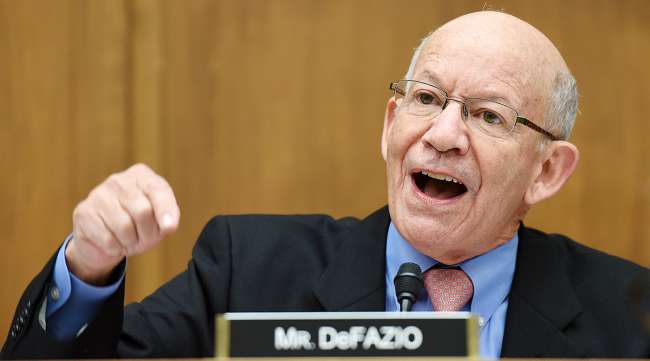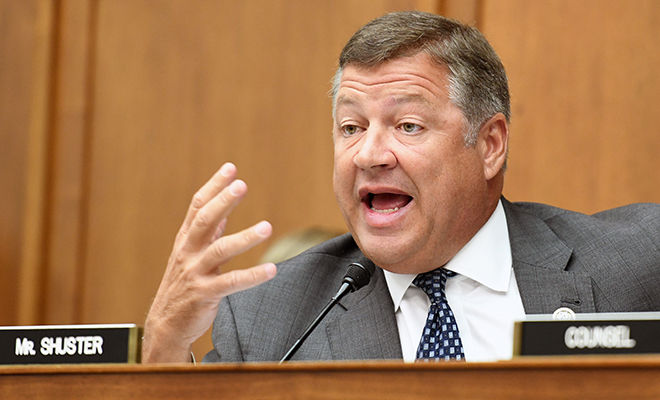Senior Reporter
Transportation Policymakers Talk Infrastructure but Fail to Act, DeFazio Says

WASHINGTON — Inaction so far this year on a long-term infrastructure funding bill in the U.S. House prompted a top Democrat to strongly voice his frustration toward Republicans during a high-profile hearing Oct. 11 that looked at ways to fund the nation’s transportation network.
Rep. Peter DeFazio (D-Ore.), the Transportation and Infrastructure Committee’s ranking member, argued Republican leaders should call up any of the funding proposals on infrastructure that have been introduced since the start of the Congress.
DeFazio is among several lawmakers sponsoring legislation on infrastructure awaiting committee consideration.
Considering such legislation would be more productive than waiting on the Trump White House to unveil its overdue $1 trillion infrastructure plan, he said.
Unable to hold back a deep sense of concern, DeFazio erupted by saying the Republican-led transportation panel basically was “just talking, while the country crumbles.”
“I mean, seriously, let’s get to work,” the Oregon Democrat said to kick off his diatribe. “You can’t meet our needs without investment. We haven’t raised the federal gas tax since 1993, when a guy named Bud Shuster brought a bunch of Republicans to vote with the Democrats and we raised the gas tax.
“Twenty-four states in just the last couple of years have recognized the need and done it,” he went on. “And there’s been no action here.”

Olivier Douliery/Bloomberg News
DeFazio added the White House’s $1 trillion infrastructure plan simply calls for providing $200 billion in federal funds as a way of enticing private investments. He wrapped up by, once again, urging the committee to “take the lead” on a long-term bill.
Committee Chairman Bill Shuster (R-Pa.), the son of former chairman Bud Shuster, said he shared DeFazio’s passion for action on a bill but stopped short of endorsing an increase of taxes on fuel. He instead signaled an interest in advancing asset recycling and P3s as alternatives for funding large-scale projects.
“We’ve gotta figure out a funding stream that’s sustainable, that is long term, but also look at these other tools in the toolbox,” Shuster said.
Shuster and other Republican leaders have indicated they would take up President Donald Trump’s infrastructure proposal this fall. The White House, however, has pushed back the plan’s release date despite Trump’s promise to unveil it during his first 100 days in office.
Stakeholders representing state highway agencies, the road construction industry and manufacturing sector at the hearing supported the notion of Congress approving a gas and diesel tax increase. They indicated as much when Rep. Hank Johnson (D-Ga.) asked for a show of hands. The officials proceeded to explain their positions.
“We’re looking for something that is sustainable long-term and [the] fuel tax will be one of those things that we’ll have to do,” said Ray McCarty, CEO of Associated Industries of Missouri, testifying on behalf of the National Association of Manufacturers.

Olivier Douliery/Bloomberg News
“We probably should address the problems on a comprehensive basis, perhaps some combination of fuel taxes,” Peter Rogoff, CEO of Sound Transit in Seattle and formerly the administrator of the Federal Transit Administration, added. “I think the committee needs to take a hard look at what will be sustainable because the one thing you will hear unanimously from this panel is everyone wants sustainability and predictability in the program.”
Several Republicans advocated for an all-options-on-the-table funding approach and followed Shuster’s lead in referring to gas tax as regressive.
Patrick McKenna, director of the Missouri Department of Transportation, emphasized the benefits of federal funding to help pay for big-ticket projects as opposed to relying on private-sector investments.
“The reality is that most transportation projects simply cannot generate a sufficient revenue stream through tolls, fares or other user fees to service debt or provide return on investment to private-sector equity holders,” McKenna said in his written remarks.
The federal Highway Trust Fund relies on revenue from fuel taxes and is headed toward insolvency in a few years. Absent a funding boost, its insolvency would cause certain disruption across the country’s transportation system, officials have warned. The federal tax on diesel is 24.4 cents per gallon and on gasoline it’s 18.4 cents per gallon.




